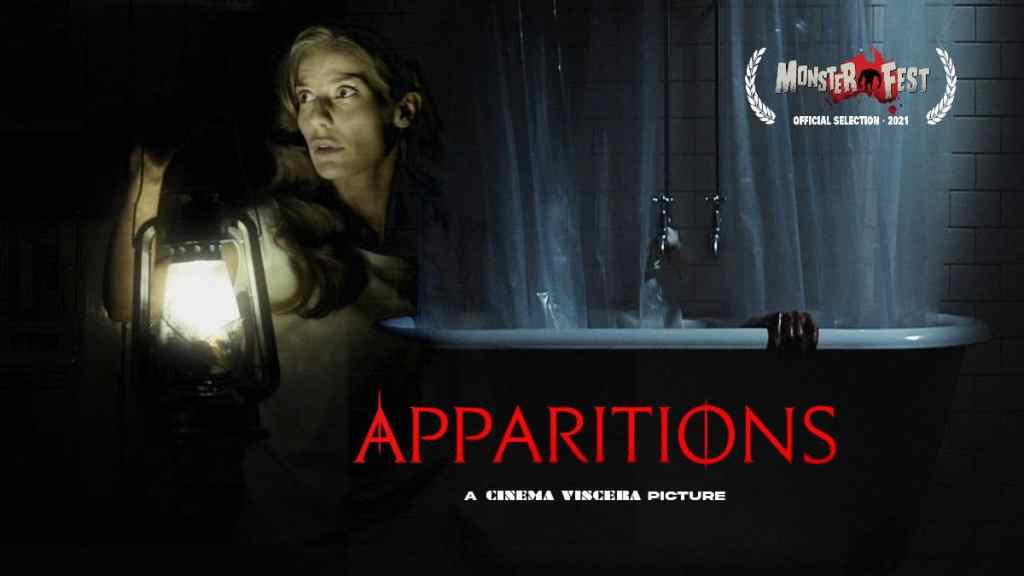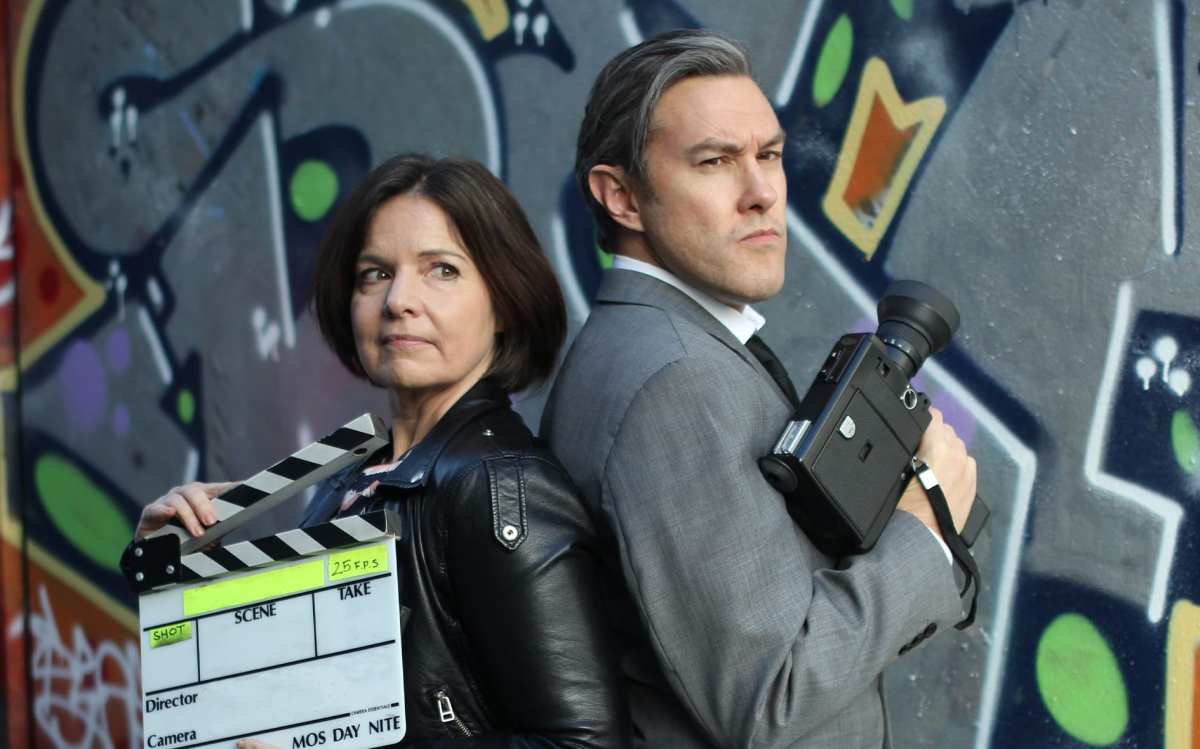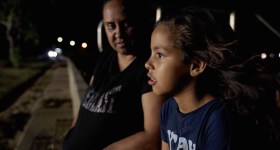In 2009 when writer/director/editor Paul Anthony Nelson and actor/writer/director Perri Cummings started up their small Melbourne production company Cinema Viscera, they wanted to make micro-to-low-budget feature films that ‘filled the gaps’, especially when it came to genre. Passionate film buffs (honestly, you want them on your film trivia team) and dedicated filmmakers, they fit their creative work around many other things.
Their first feature film Trench (2019) was a girl-powered detective comedy film noir with Cummings in the lead. Their second feature, Apparitions heads into the horror genre with some ghostly trappings and premieres at Monster Fest this month. Shot in 24 days in Victoria with a small cast, its written, produced and directed by Nelson and Cummings, shot by award winning filmmaker Tim Egan (Curve), with makeup and SFX by Mia-Kate Russell and an original score by Adam Rudegeair. Led by newcomer Cate O’Connor, the film stars Stefan Dennis (Neighbours), Cummings, Shanon Kulupach, Fabio Motta, Kristina Benton and Wayne Tunks.
Read: The Two of Us: Victoria Thaine and Naomi Mulholland
We caught up with Paul and Perri to talk about what drives them, inspires them, and frustrates them about the Australian screen industry. They also give some top notch viewing recommendations.
Screenhub: How would you describe what you do to someone at a party?
Perri Cummings: I guess we’re independent filmmakers who make mad little genre films, in that sort of theatrical way of pulling out a box of costumes, getting our friends together and putting on a show! But honestly, we like to really dig into character, get creative and explore the social conscience beneath the work.
Paul Anthony Nelson: Assuming there is any, haha.
How did you meet each other and when did you know you wanted to work together?
Perri: We met while working together – we were both cast in a play (Sam Shepard’s Savage Love) directed by the lovely Samantha Hill, who we later cast as the lead in our first feature film, Trench! Which means we’ve been working together since the beginning – obviously the play went well for us – and we learned pretty quickly that we worked well together, even as our relationship grew.
Paul: We started the play as strangers and ended it in a relationship. The ‘showmance’ never ended.
Paul, what are the strengths Perri brings to your partnership, in work and life?
That face, obviously. And with her history as a working actor – I was only playing at being an actor – has been hugely beneficial on and off set, getting the best out of our casts. Plus she’s so incredibly, tirelessly supportive, she always has my back, in film and in life.
What’s the hardest thing about working together? And the best?
Perri: The hardest thing is probably making sure we ‘turn off’ – that we don’t just work 24/7, which, me being an Aries, is a real possibility – to make sure we have ‘us time’. And learning to not be too sensitive to each other’s criticisms or suggestions, to learn that we’re both doing it with love and wanting our projects to be better.
Paul: I’m always insisting on the ‘us time’ – watching movies and shows, putting on home film festivals – probably a little too much! As for the best thing, for me, it’s the knowledge of having someone beside you at all times who shares your vision, who you can bounce ideas off, run things by. It’s almost impossible for me to make binary decisions. (Yes, I’m a Gemini.)
Perri: It’s about expanding the vision; it’s great to have someone else’s take on something, that ‘oh, you see this differently’ moment – even though we begin collaborating from page one, it’s exciting, when we sit down to talk though the details of a scene, that we can both be picturing something completely different, it’s fun to find the way to get the best of both worlds. And I am focused on the emotional through-line, while Paul is great at getting the action and story drive working. I’m an ‘opener’, a million ideas all at once, and Paul is a ‘closer’, he is great at the details and making sure we get what we want on set, and we both work right through to the last hour trying to find creative ways to make the work better, to solve problems or make the story clearer.
What does the term ‘microbudget feature film’ mean to you two?
Paul: Something we can make without bankrupting ourselves. Seriously, for us, it’s been films well under $100,000 that we can raise most of the money for ourselves, through donations.
Perri: Otherwise, we would never have made a film.
Paul: I often slag off digital film, but to be honest, without the advances in DSLR and digital technology, making shooting, recording and editing equipment so accessible, we wouldn’t be here. It’s given so many people from so many backgrounds so many chances to get their visions out there.
Perri: We’ve made two films on tiny budgets now, and while we’re keen to expand to bigger stories and somewhat larger budgets, we still want to keep our shoots lean with a small cast and crew, while working toward ensuring our team is paid properly and has the time for us to work together to develop the next project into something truly exciting. We go for the Good-Cheap-Slow model, which helps us to maintain control while giving us the space to keep developing as film makers.
You describe your company as making ‘defiantly different genre film’. Can you expand?
Perri: We love putting ‘real’, relatable characters into heightened genre work – folks who have little to no skills but a lot of heart and humour and often win against the odds. We definitely have a message buried deep within the story, but our focus is on an entertaining tale that usually ends on a hopeful note, and we also like to ask questions rather than offer solutions, allowing the audience to bring their own unique experience to the work and find connection. We are also big film and literature fans, and we really enjoy peppering this through the story and will do a research deep dive as we develop new projects. I think we are defiantly different because we don’t want to compromise on our creativity, we want to find ourselves through our creativity.
Your latest film Apparitions is premiering at Monsterfest. What’s it about? What can we expect? And how was this different to what you’d done before?
Paul: Apparitions is the story of Lily, a young woman orphaned from a young age, who’s been haunted by loss and loneliness her whole life, as well as a presence she’s never been able to explain or even define. On the day of her university graduation, she’s given a key to the family home she never knew – one she’s only seen in nightmares – and decides to go and unlock these secrets to her life and history.
We built it to be a low-key journey through the history of horror cinema, through a sort of ‘90s young adult horror into rural Australian gothic, to a haunted house to… well, that would be telling. As for how different it is from our previous work, while we both personally adore horror, and horror flourishes have found its way into other works, this is only our second real horror film, and our first horror feature. But now we’ve got the taste for blood, we want more.

What inspires you?
Perri: So many things! Stories of all varieties inspire me, beautifully flawed human beings and maximising emotional experience – I think a lot of my writing is about spring-boarding off an interesting story, a snippet of conversation, an idea and then wanting to expand it and really hunker down to capture the character’s emotional journey visually and textually. I love texture and movement as a way to evoke story. I’m hugely inspired by the great David Lynch, Cattet/Forzani, Gothic and classic literature and incredible theatre makers like Romeo Castellucci and choreographers like Pina Bausch. I sound like a bit of a wanker, but I do love that Arthouse-Horror House mix.
Paul: I like movies. (laughs) I’m inspired by classic film genres and filmmakers, and my film ideas tend to centre around two ideas: throwing regular, barely-capable people into heightened genre situations, and the idea of taking the real world we know and then shifting something about it out of whack, which is an ethos I’ve taken from Stephen King, who is by far my biggest non-directorial influence (along with screenwriters like William Goldman and Shane Black).
What are some of your proudest moments?
Perri: Having Sam Hill nominated for Best Emerging Talent at the OzFlix awards. Getting into Monster Fest. Seeing how good my daughter Cate O’Connor is as the lead of Apparitions. Finishing the shoot on Apparitions with the best two weekends of filming of our lives. Not quitting just about every other day. Filmmaking is hard but it’s also the most fun you can have while still calling it working.
Paul: 100% agree on all that, but Trench being nominated for Best Film Under $500,000 at those same OzFlix awards was also incredible, that our weird little modern feminist noir was nominated by a jury that included some incredible people, like George Miller, Margaret Sixel, Kriv Stenders, Claudia Karvan and David Williamson – crazy. And the fact we’ve managed to make two feature films, which is something so rare in this country, and we’re developing more. We’re super-proud of that.
Is there anything that makes you angry or frustrated about the Australian screen industry?
Perri: I hope it’s changing, but there hasn’t always been the support for genre filmmakers here, even though we have had some of the most amazing of them born and trained here, they have to move away to keep working. Also, the industry cultivates a feeling that there are only a few places at the table here, which can make for a feeling of competition rather than support. We believe everyone should be able to create. We need to hear from all the beautiful diverse voices, and remember we all have interesting stories to tell. It’s hard for emerging filmmakers to get the experience and funding they believe they need to make a feature film, or feel like they have value in the industry. I think we should foster talent, look at what is essential so we can reduce budgets and make more films! And remember, there is a place for everyone.
Paul: Completely agree. The other thing that rankles me nowadays is this feeling that you have to prove that your project is socially important in some way – there are some great and important films being made but often the movies we love the most, the ones that make people go to the cinema to see movies, those that inspired many of us to make movies, were fun, thrilling, great entertainments. I think the powers that be have become so obsessed with chasing festival kudos and justifying funds to government that they’ve forgotten why people love the art form.
‘I think the powers that be have become so obsessed with chasing festival kudos and justifying funds to government that they’ve forgotten why people love the art form.’
Paul Anthony Nelson
Best professional advice you’ve ever been given? And the worst?
Perri: Honestly, the best and worst was when my year 12 English teacher told me I would never be an actor and I’ve spent my whole life proving her wrong. I think support and guidance are the things that have given me the greatest boost and when someone tells me why they like something we did, it’s all worth it.
Paul: I’ve not had that much professional advice, but it’s always lovely when we do chat to established filmmakers who look at how we’ve built our work to date as independent filmmakers and said that we’re doing the right thing, to keep doing what we’re doing. That’s been gratifying.
What have you been watching and loving in 2021 in film and TV, local or international?
Paul: Locally, we loved Wayne Blair and Nel Minchin’s documentary Firestarter: The Story of Bangarra – not the choice you expected, I bet, haha – but it just moved us so deeply. The Page brothers are astonishing artists, and everyone should know their story and work. Otherwise, my favourite film release of the year so far is Sean Durkin’s The Nest, a brilliant domestic drama about greed and familial gender roles which is directed like a horror film. We adored Regina King’s One Night in Miami, as well. And I f-ing LOVE Succession.
Perri: The TV series Midnight Mass by Mike Flanagan and Stephen King and Pablo Larrain’s Lisey’s Story for me.
Paul: We’re also addicted to Taskmaster, every episode of which is like a box of pure, uncut, insane joy.
Where can we find you, and how can we watch your films?
We’re on all the socials at @cinemaviscera and @apparitionsfilm.
All our shorts are on our Vimeo and YouTube pages (just search for ‘Cinema Viscera’). Trench is available to rent or buy on iTunes, to rent on Beamafilm and OzFlix and streaming on Tubi. And Apparitions is screening at Monster Fest at Carlton’s Cinema Nova on December 11th.
Monster Fest 2021 runs 2 – 12 December at Melbourne’s Cinema Nova. Apparitions screens Sat 11 Dec, 7:15pm.





